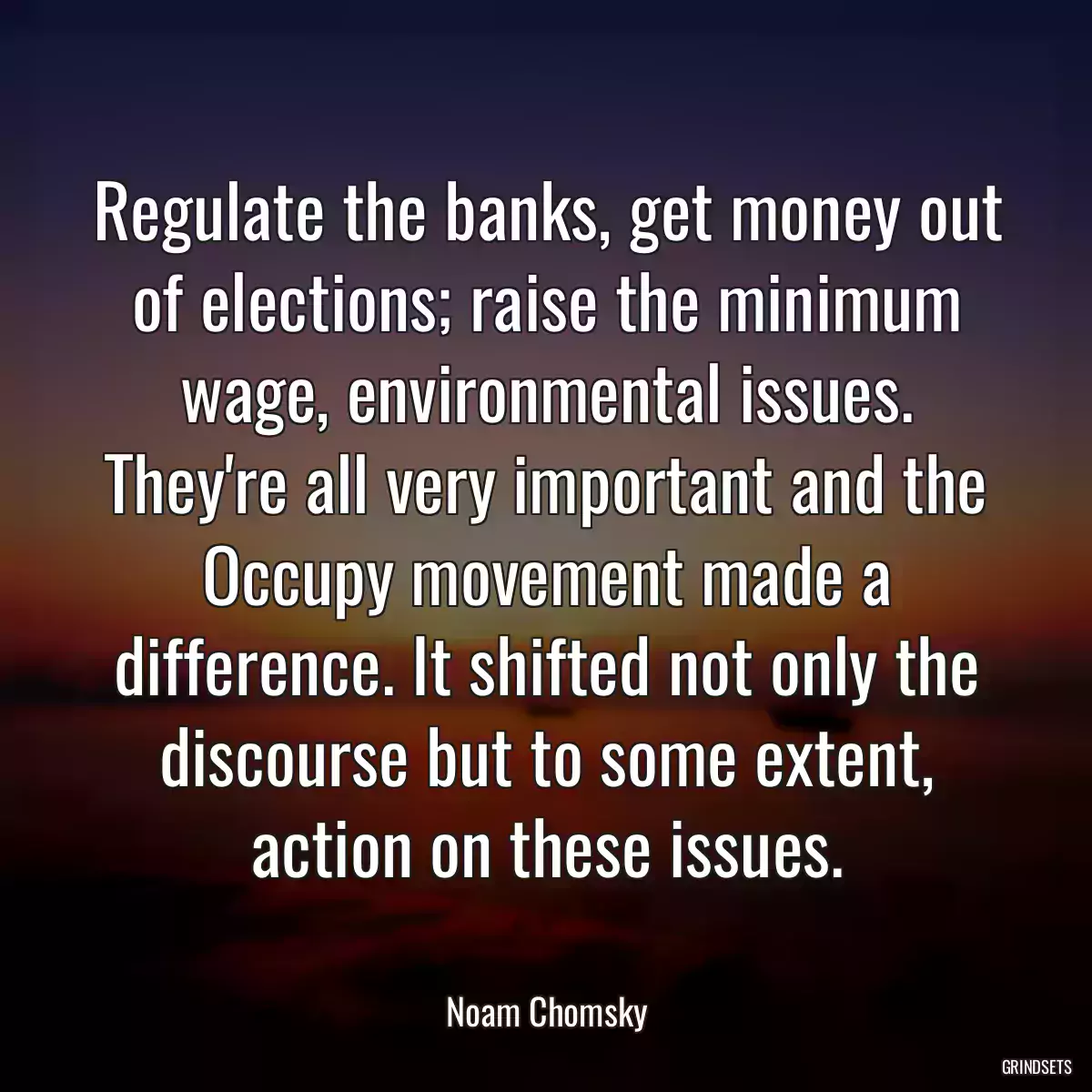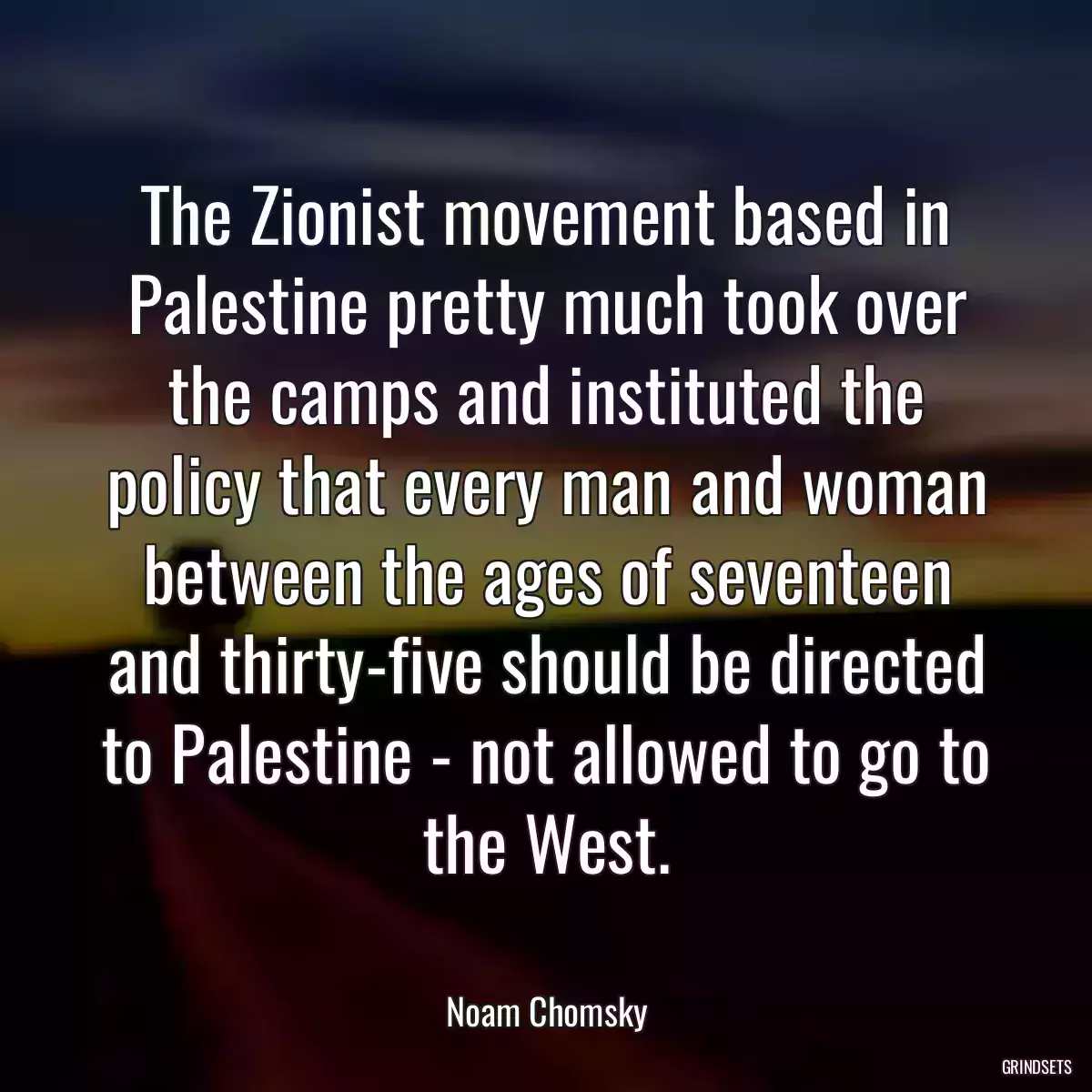![In some ways, [the student anti-sweatshop movement] is like the anti-apartheid movement, except that in this case its striking at the core of the relations of exploitation. Much of this was initiated by Charlie Kernaghan of the Institute for Global Labour and Human Rights.](/fotos/bd/bd50cdc1c73a5ad6f31b979f6cd53da4.webp)
Quotes Noam Chomsky - page 10
Find dozens of Noam Chomsky with images to copy and share.
![In some ways, [the student anti-sweatshop movement] is like the anti-apartheid movement, except that in this case its striking at the core of the relations of exploitation. Much of this was initiated by Charlie Kernaghan of the Institute for Global Labour and Human Rights.](/fotos/bd/bd50cdc1c73a5ad6f31b979f6cd53da4.webp)
In Western Europe, Turkey is regarded as uncivilized, so they can't come in into the European Union until they're civilized. I think it's the other way around. If you could achieve the level of civilization of, say, Turkish intelectuals, it would be quite an achievement.
An unstated but crucial premise is that the "responsible men" achieve that exalted status by their service to authentic power, a fact of life that they will discover soon enough if they try to pursue an independent path.
It's hard to achieve that, especially in a free society, but it's been done, and that's the kind of thing that activists in the IWW have to work against, right on the shop floor. It's not so simple, but it's been done before.
You may also like
The people who were really important are the ones whose names are forgotten. And that's true of every movement that ever existed.
The most interesting - in fact, inspiring - people I met there [Porto Alegre] are those who remain nameless: representatives of the international campesino movement, the East Timorese delegation,... - the usual heroes, who disappear, unknown, apart from the consequences of their work.
Some of the most moving experiences I've had are just in black churches in the South, during the Civil Rights Movement, where people were getting beaten, killed, really struggling for the most elementary rights.
The Occupy movement did create spontaneously communities that taught people something: you can be in a supportive community of mutual aid and cooperation and develop your own health system and library and have open space for democratic discussion and participation. Communities like that are really important.
Anarchism means all sort of things to different people but the traditional anarchists' movements assumed that there'd be a highly organized society, just one organized from below with direct participation and so on. Actually, one piece of the media confusion has a basis because there really are two different strands in the occupy movement, both important, but different.

To pay attention to the actual core of the movement - that would be pretty hard. Can you concentrate for example on either the policy issues or the creation of functioning democratic communities of mutual support and say, well, that's what's lacking in our country that's why we don't have a functioning democracy - a community of real participation. That's really important. And that always gets smashed.
Cuba forces in Angola gave a real shot in the arm to the liberation movements, and it also was a lesson to the white South Africans that the end is coming. They can't just hope to subdue the continent on racist grounds.
The lessons are, unfortunately, that a small weak country that is facing an extremely hostile and very violent superpower will not make much progress unless there's a strong solidarity movement within the superpower that will restrain its actions. With more support within the United States, I think the Haitian efforts could have succeeded.
A lot of association on the internet is highly constructive. There are people interacting, interchanging ideas, making plans, coordinating activities; take any of the popular movements, a lot of the organization is through the internet. We want to have a demonstration or we want to have a meeting, its done through the internet. I think that's all to the good.
There are all the activist groups on every imaginable topic - solidarity groups, environmental and feminist groups - sectors of these movements do very valuable work.
In fact, I was in a lab that was a hundred percent funded by the Pentagon, and it was one of the centers of the organized antiwar resistance movement.
I don't claim to know a lot about Mexico, but I did talk to quite a number of left Mexican intelectuals, and they all said the same thing. That there's a lot of popular, kind of, concern and activism, but it is very fragmented. That the groups have very specific, narrow agendas and they don't interact and cooperate with one another. Ok, that's something you have to overcome to build a mass popular movement. And that's, media can help, but they also benefit from it.
Unless that happens, unless you get, you know, kind of integration of activists' concerns and movements, it will be, each one will be 'preaching to the choir'.
You may also like

There's a strong nativist tradition - saying, "we have to protect ourselves" - that comes from the founding of the country. If you read Benjamin Franklin, who was one of the leading figures of the Enlightenment in the United States and the most distinguished representative of the movement here, he actually advised that the newly founded republic should block Germans and Swedes because they were too "swarthy" - dark.